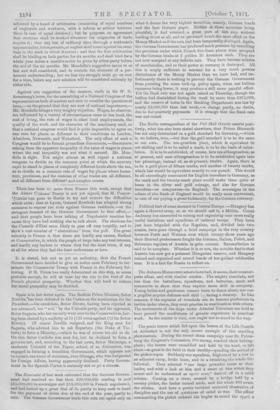The Economist of last week estimated that the German Govern-
ment had received no leas than /20,000,000 sterling in gold (15,000,000 in sovereigns and 115,000,000 in French napoleons), and had locked up a great deal of it, partly to keep cash in hand for the payment of debts due at the end of the year, partly to coin. The German Government lends this coin out again only on what it deems the very highest securities, namely, German bonds and the best German paper. Neither of these securities being plentiful, it had retained a great part of this sum without lending it out at all, and so produced much the same effect on the. Money Market as if the coin bad been temporarily destroyed. Again, the German Government has produced much pressure by cancelling the provision under which French five-franc pieces were accepted by the German beaks at 2 gulden 20 kreutzers each. They are, not now accepted at any definite rate. They have become articles. of merchandise, and so their power as currency is destroyed. All this is amply sufficient to account for a very much greater. disturbance of the Money Market than we have had, and un- fortunately there is nothing to prevent the German Government from pursuing the same lock-up policy again, when our bullion. resources being lower, it may produce a still more painful effect. Yet the Bank rate was not again raised on Thursday, though the- bullion had diminished during the week by more than 1875,000, and the reserve of notes in the Banking Department was less by nearly 12,000,000 than last week,—a change partly, no doubt, due to the quarterly payments. It is strange that the Bank rat& was not raised.


































 Previous page
Previous page